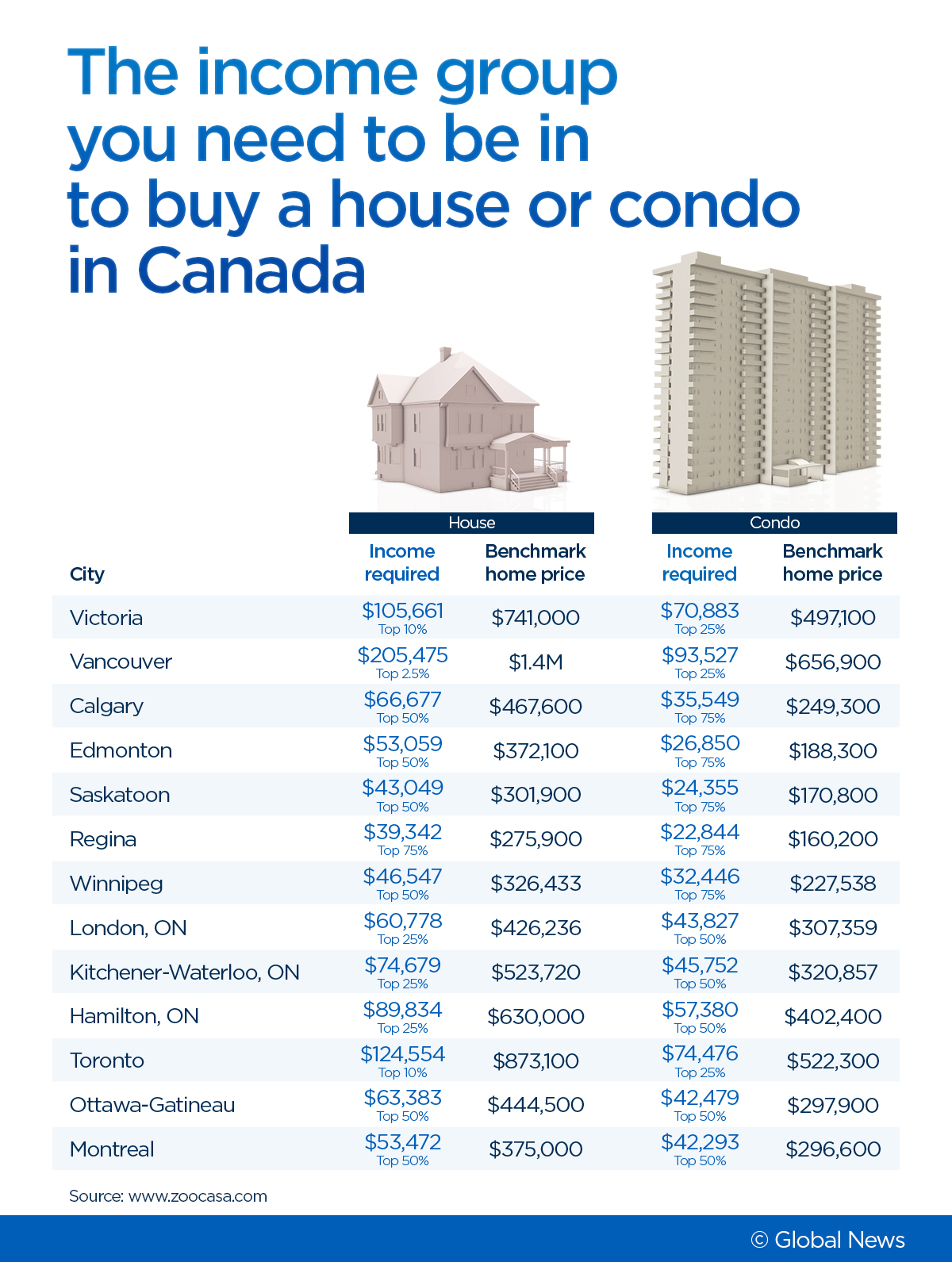No one but those perched atop the income ladder can afford to buy a home in Toronto and Vancouver, a new study confirms. For first-time homebuyers hoping to buy an average house with an average wage, the Prairies are a much better place to be, data compiled by real-estate search site Zoocasa.

And yet, Canada’s most expensive real-estate markets aren’t hemorrhaging young blood at the rate you’d think given their obscene home prices, according to a different report.
“For every millennial leaving a major Canadian city for more affordable digs in the same province, there are between seven and 12 millennials moving in from another country or province,” writes RBC economist Robert Hogue.
WATCH: Ottawa’s new incentive for the first-time homebuyer explained

That’s hard to believe when you look at Zoocasa’s numbers. In Vancouver, you’d need to be making at least $205,500 to qualify for a mortgage for a middle-of-the-road house worth $1.4 million. In other words, you’d need to be in the top 2.5 per cent of the income distribution to buy an average home.
In Toronto, you had better be making $125,000 — in the top 10 per cent of local incomes — if you want to purchase the typical home, now available for an eye-watering $873,000.
READ MORE: What to know about the new CMHC mortgage incentive
It doesn’t get much better if you’re looking at condos. The benchmark price of an apartment in Vancouver is just shy of $657,000, which requires an income of around $94,000, which would put you in the top 25 per cent of earners. In Toronto, you’re looking at a minimum income of around $75,000 to qualify for a mortgage for your ordinary condo worth $522,000.
But the bar for first-time buyers in those cities is arguably even higher than those numbers suggest. Zoocasa based its calculations on a 30-year mortgage, which is longer than the 25-year amortization most Canadians opt for and only available to those who can pony up a 20 per cent down payment.
WATCH: The pros and cons of a 30-year mortgage

Still, the data paints a much prettier picture for first-time homebuyers in the Prairies. Regina was the most affordable city Zoocasa looked at, with both houses and condos affordable for anyone but those in the bottom 25 per cent of incomes. But Saskatoon, Winnipeg, Calgary and Edmonton aren’t far behind, with average homes within reach for those with average incomes.
READ MORE: From broom closet to detached home — what millennials can afford across Canada
And despite recent home-price increases, Montreal is still firmly in affordable territory as well. The dream of homeownership lives on in the city for those with middling incomes — at least for now.
The report doesn’t include Atlantic Canada due to a lack of comparable data, Zoocasa told Global News.
- Gas prices surge in some parts of Canada. What’s causing pain at the pumps?
- Roll Up To Win? Tim Hortons says $55K boat win email was ‘human error’
- Ontario premier calls cost of gas ‘absolutely disgusting,’ raises price-gouging concerns
- Netflix beats subscriber targets, but revenue falls short of forecast
Sky-high prices aren’t fuelling a millennial exodus
You’d think impossibly high real-estate prices would be pushing young people to look for homes and jobs outside Vancouver and Toronto.
And that is happening to an extent. There were 13,200 more millennials who moved from Vancouver, Toronto and Montreal to areas within the same province than millennials flocking the opposite way last year. That outflow has more than tripled since 2015 in the three cities taken together. In Vancouver alone, the exodus has increased almost eightfold.
READ MORE: 2 years in, Trump’s immigration squeeze is feeding Canada’s tech talent pipeline
That, though, doesn’t mean that Canada’s largest cities are losing young people, writes RBC’s Hogue. The inflow of 20-to-34-year-olds coming from out-of-province or another country more than makes up for those who are packing up in search of more affordable digs.
Toronto’s population of millennials grew by 58,000 in 2018, Montreal’s went up 22,000, and even Vancouver managed to add 16,000.
WATCH: The pros and cons of renting vs. owning

But almost all that growth is coming from young professionals and students from abroad. Less than 4,000 Canadian millennials from other provinces made the move to the country’s three largest cities in 2018, the report shows. And changes in the temporary foreign worker program in 2015 more than halved the net inflow of millennials that year.
READ MORE: Is too much of your wealth tied up in the housing market?
With Canada set to increase its annual immigration target from to 350,000 in 2021, Hogue predicts the ranks of millennials in Vancouver, Toronto and Montreal will keep on growing.
That should prop up the demand for housing in Canada’s major cities. But it may not be enough to prevent the homeownership rate from falling among young households.
“High housing prices set an impossibly high bar to clear for many millennials to become homeowners in a big city,” Hogue writes. “Expect a greater proportion of them to rent in the future.”





Comments